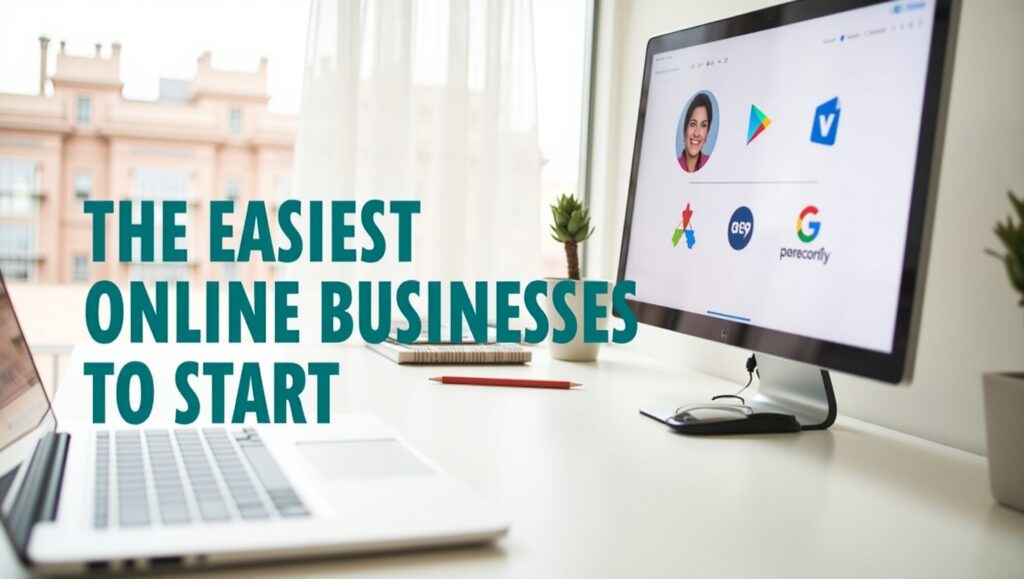Disclaimer: The information provided in this article is for educational purposes only and should not be considered as financial or business advice. Starting any business involves risks, and success is not guaranteed. Please conduct your own research and consider consulting with professionals before making any business decisions. The opinions expressed here are based on research and experience, not professional consultation.
Quick Start Guide: Top Online Business Models by Startup Cost
Before diving into the comprehensive guide, here’s a quick overview of the easiest online businesses to start today:
Ultra-Low Cost (Under $100)
- Content creation and social media management
- Virtual assistant services
- Online tutoring and coaching
- Affiliate marketing
- Freelance writing and design
Low Cost ($100-$1,000)
- Dropshipping stores
- Print-on-demand products
- Digital course creation
- Consulting services
- Email marketing services
Moderate Investment ($1,000-$5,000)
- E-commerce stores with inventory
- Software as a Service (SaaS) products
- Subscription box services
- Digital agencies
Starting an online business has never been more accessible than it is today. However, if you’re feeling overwhelmed by the countless options available, you’re not alone. Many aspiring entrepreneurs struggle with choosing the right business model, understanding startup costs, and navigating the technical aspects of going digital.
The good news is that on average, it costs between $1,000 to $60,000+ to start an online business in 2025, but many successful ventures can be launched with significantly less capital. Furthermore, global e-commerce sales are projected to reach $8.09 trillion in 2028, indicating massive opportunities for newcomers.
Related Reading: For those interested in understanding the broader landscape of digital entrepreneurship, check out Entrepreneur’s comprehensive guide to small business ideas for additional inspiration.
In this comprehensive guide, I’ll walk you through the easiest online businesses to start today, complete with startup costs, required tools, and actionable steps you can implement immediately. Whether you’re looking to create a side income or build a full-time business, you’ll find practical options that match your budget and skill level.
Why Starting an Online Business is Easier Than Ever
The digital revolution has dramatically lowered the barriers to entry for aspiring entrepreneurs. Consequently, what once required significant capital investment and technical expertise can now be accomplished with basic computer skills and minimal startup funds.
Several factors contribute to this accessibility revolution. First, cloud-based tools and platforms have eliminated the need for expensive software licenses and hardware infrastructure. Additionally, social media platforms provide free marketing channels that can reach global audiences instantly. Moreover, payment processing systems like Stripe and PayPal have simplified financial transactions, making it easier to accept payments from customers worldwide.
According to recent research, approximately 82% of small business failures are due to cash flow problems and inadequate financial planning. However, online businesses typically have lower overhead costs compared to traditional brick-and-mortar operations, which significantly reduces this risk factor.
The rise of artificial intelligence tools has also democratized many business functions. For instance, platforms like Canva enable anyone to create professional-looking graphics without design experience, while ChatGPT can assist with content creation and customer service automation.
Content Creation and Digital Services: The Zero-Inventory Approach
Content creation represents one of the most accessible entry points into online entrepreneurship. Unlike traditional businesses that require inventory management, content-based businesses operate on your knowledge, skills, and creativity.
Social Media Management Services
Social media management has become an essential service for businesses of all sizes. As a social media manager, you’ll create content, schedule posts, engage with followers, and analyze performance metrics for your clients.
Getting Started:
- Develop expertise in platforms like Instagram, TikTok, LinkedIn, and Facebook
- Create a portfolio showcasing your own social media presence
- Use scheduling tools like Buffer or Hootsuite to manage multiple accounts
- Charge between $500-$3,000 per month per client, depending on scope
Essential Tools:
- Canva Pro for design ($15/month)
- Later for scheduling ($25/month)
- Google Analytics for tracking (free)
Online Tutoring and Coaching
The online education market continues to expand rapidly, creating opportunities for subject matter experts to monetize their knowledge. Whether you’re skilled in academic subjects, professional development, or personal growth, there’s likely a market for your expertise.
Implementation Strategy:
- Identify your area of expertise and target audience
- Create a profile on platforms like Teachable or Thinkific
- Develop a structured curriculum with clear learning outcomes
- Price your services competitively, typically $25-$150 per hour
Success Tip: Start with one-on-one sessions to build testimonials, then scale to group coaching or self-paced courses for increased revenue potential.
Freelance Writing and Content Marketing
Content marketing drives business growth across industries, creating consistent demand for skilled writers. Furthermore, this business model requires minimal startup investment while offering excellent scalability potential.
Specialization Areas:
- Blog writing and SEO content
- Email marketing campaigns
- Social media copywriting
- Technical writing and documentation
- Grant writing and proposal development
Platform Recommendations:
- Upwork for finding initial clients
- Contently for premium opportunities
- LinkedIn for direct client outreach
E-commerce Without Inventory: Dropshipping and Print-on-Demand
E-commerce represents a massive opportunity, but traditional models require significant inventory investment. Fortunately, alternative approaches allow you to start an online store without holding physical products.
Dropshipping Business Model
Dropshipping eliminates inventory management by partnering with suppliers who handle storage and shipping directly to customers. With global retail e-commerce sales expected to surpass $7.3 trillion by 2025, dropshipping and print-on-demand are low-risk ways to get started.
Setup Process:
- Choose a profitable niche with sufficient demand
- Research reliable suppliers through AliExpress or Oberlo
- Create an online store using Shopify or WooCommerce
- Implement effective marketing strategies to drive traffic
Cost Breakdown:
- Shopify subscription: $29/month
- Domain name: $15/year
- Marketing budget: $200-$500/month initially
- Payment processing: 2.9% per transaction
Success Factors:
- Focus on products with high perceived value
- Prioritize customer service to build trust
- Test multiple products to find winners
- Optimize for mobile shopping experience
Print-on-Demand Products
Print-on-demand (POD) allows you to sell custom-designed products without inventory investment. When customers place orders, third-party services print and ship products directly to them.
Popular Product Categories:
- T-shirts and apparel
- Mugs and drinkware
- Wall art and posters
- Phone cases and accessories
- Stickers and decals
Recommended Platforms:
- Printful for high-quality products
- Redbubble for artistic designs
- Etsy for handmade aesthetics
- Amazon Merch on Demand for volume sales
Design Tools:
- Adobe Illustrator for professional designs
- Canva for beginner-friendly templates
- GIMP for free image editing
Digital Products and Online Education
Digital products offer excellent profit margins since they can be sold repeatedly without additional production costs. Moreover, they position you as an expert in your field while generating passive income.
Online Course Creation
The online learning market continues to grow as people seek convenient ways to develop new skills. Therefore, creating and selling online courses represents a scalable business opportunity.
Course Development Process:
- Validate your course idea through surveys and pre-sales
- Create a detailed course outline with clear learning objectives
- Record high-quality video content using Loom or Camtasia
- Upload to platforms like Teachable or Udemy
Pricing Strategies:
- Beginner courses: $49-$199
- Intermediate courses: $199-$499
- Advanced/specialized courses: $499-$2,000+
Marketing Approaches:
- Content marketing through blog posts and videos
- Email marketing to nurture leads
- Social media engagement and community building
- Partnerships with influencers in your niche
Digital Downloads and Templates
Digital downloads provide immediate value to customers while requiring minimal ongoing maintenance. Additionally, they can serve as lead magnets to build your email list.
Popular Digital Product Types:
- Business templates and worksheets
- Design resources and graphics
- Ebooks and guides
- Software tools and applications
- Music and audio files
Creation Tools:
- Canva for templates and graphics
- Adobe Creative Suite for professional design
- Notion for productivity templates
- Google Docs for document creation
Service-Based Online Businesses
Service-based businesses leverage your existing skills and expertise to solve problems for clients. Consequently, they often require minimal startup investment while offering immediate income potential.
Virtual Assistant Services
The virtual assistant industry has exploded as businesses seek cost-effective support for administrative tasks. Furthermore, this business model offers flexibility and scalability as you develop specialized skills.
High-Demand VA Services:
- Email management and customer support
- Social media management and content creation
- Data entry and research tasks
- Calendar management and appointment scheduling
- Basic graphic design and website maintenance
Skill Development Resources:
- Coursera for professional development
- Skillshare for creative skills
- LinkedIn Learning for business skills
Client Acquisition Strategies:
- Create profiles on Belay and Time Etc
- Network through LinkedIn and Facebook groups
- Offer initial services at competitive rates to build testimonials
Consulting and Professional Services
If you have specialized knowledge in areas like marketing, finance, or technology, consulting offers excellent earning potential. Additionally, it positions you as an industry expert while building valuable professional relationships.
Consultation Areas:
- Digital marketing and SEO
- Business strategy and operations
- Financial planning and analysis
- Technology implementation
- Human resources and recruitment
Service Delivery Methods:
- One-on-one video consultations
- Group workshops and training sessions
- Done-for-you project work
- Ongoing retainer relationships
Tools for Consultants:
- Calendly for appointment scheduling
- Zoom for video conferences
- Slack for client communication
- Asana for project management
Technology-Enabled Businesses
Technology has democratized business creation, enabling entrepreneurs to build sophisticated operations with minimal technical expertise. Furthermore, these businesses often offer excellent scalability potential.
Software as a Service (SaaS)
While SaaS development traditionally required extensive programming knowledge, modern no-code platforms have made it accessible to non-technical entrepreneurs. Moreover, successful SaaS businesses generate recurring revenue through subscription models.
No-Code SaaS Platforms:
- Bubble for web applications
- Glide for mobile apps
- Zapier for automation tools
- Airtable for database applications
SaaS Business Ideas:
- Project management tools for specific industries
- Customer relationship management (CRM) systems
- Marketing automation platforms
- Educational technology solutions
- Health and fitness tracking applications
Development Process:
- Identify a specific problem that needs solving
- Create a minimum viable product (MVP)
- Test with early adopters and gather feedback
- Iterate based on user input
- Scale marketing efforts for growth
Affiliate Marketing
Affiliate marketing allows you to earn commissions by promoting other companies’ products. Additionally, it requires minimal startup investment while offering unlimited earning potential.
Successful Affiliate Marketing Strategies:
- Choose products aligned with your audience’s interests
- Create honest, helpful content that builds trust
- Diversify across multiple affiliate programs
- Focus on high-quality traffic rather than quantity
Top Affiliate Programs:
- Amazon Associates for physical products
- ShareASale for diverse merchants
- Commission Junction for enterprise brands
- ClickBank for digital products
Content Creation Platforms:
- YouTube for video reviews and tutorials
- Instagram for lifestyle and product showcases
- Email newsletters for direct audience engagement
- Blogs for in-depth product comparisons
Getting Started: Your Action Plan
Now that you’ve explored various online business options, it’s time to create a concrete action plan. First, assess your current skills, interests, and available time commitment. Then, choose a business model that aligns with these factors while considering your financial goals.
Step 1: Business Model Selection
Consider these factors when choosing your online business:
- Time Investment: How many hours can you dedicate weekly?
- Startup Budget: What’s your available investment capital?
- Skill Level: Which options match your current abilities?
- Income Goals: What revenue targets do you want to achieve?
- Scalability: Do you want passive income or hands-on involvement?
Step 2: Market Research and Validation
Before investing time and money, validate your business idea through market research:
- Analyze competitor offerings and pricing
- Survey potential customers about their needs
- Test demand through social media or landing pages
- Identify your target audience’s pain points
Step 3: Essential Tools and Setup
Regardless of your chosen business model, certain tools are universally helpful:
- Website Builder: WordPress or Squarespace
- Email Marketing: Mailchimp or ConvertKit
- Analytics: Google Analytics and Google Search Console
- Payment Processing: Stripe or PayPal
- Project Management: Trello or Notion
Step 4: Launch Strategy
Plan your launch systematically to maximize success:
- Create a content calendar for consistent marketing
- Build an email list before official launch
- Develop partnerships with complementary businesses
- Set up tracking systems to monitor performance
Common Pitfalls to Avoid
Learning from others’ mistakes can save you time, money, and frustration. Here are the most common pitfalls that derail online businesses:
Perfectionism Paralysis: Many entrepreneurs delay launching while perfecting their product or service. Instead, launch with a minimum viable product and improve based on customer feedback.
Ignoring Market Research: Assuming you know what customers want without validation leads to products nobody purchases. Always test demand before full investment.
Underestimating Marketing: Building a great product is only half the battle. Successful businesses invest significantly in marketing and customer acquisition.
Neglecting Customer Service: Online businesses live or die by their reputation. Prioritize excellent customer service to build trust and encourage referrals.
Scaling Too Quickly: Rapid growth can strain resources and compromise quality. Scale systematically while maintaining service standards.
Frequently Asked Questions
Q: How much money do I need to start an online business? A: Startup costs vary significantly by business model. Content creation and service-based businesses can start with under $100, while e-commerce ventures typically require $500-$5,000. On average, it costs between $1,000 to $60,000+ to start an online business in 2025, but many successful businesses begin with much less through bootstrapping strategies.
Q: How long does it take to see profits from an online business? A: Timeline to profitability depends on your business model and execution. Service-based businesses can generate income within weeks, while product-based ventures may take 3-12 months to become profitable. Consistency in marketing and customer acquisition is crucial for faster results.
Q: Do I need technical skills to start an online business? A: While technical skills are helpful, they’re not required for most online businesses. Modern platforms like Shopify, WordPress, and Teachable are designed for non-technical users. Focus on learning one platform thoroughly rather than trying to master multiple tools simultaneously.
Q: What’s the best online business for beginners? A: Service-based businesses like virtual assistance, content creation, or consulting are ideal for beginners because they require minimal startup investment and leverage existing skills. They also provide immediate income potential while you learn about online business fundamentals.
Q: How do I choose between different online business models? A: Consider your available time, startup budget, skills, and income goals. If you want passive income, focus on digital products or affiliate marketing. For immediate income, choose service-based models. If you enjoy working with people, consider coaching or consulting.
Conclusion
Starting an online business today is more accessible than ever, with numerous low-cost options available for entrepreneurs at every skill level. Whether you choose content creation, e-commerce, digital products, or service-based models, success depends on consistent execution, customer focus, and continuous learning.
Remember that every successful online business started with a single step. Don’t let perfectionism or analysis paralysis prevent you from taking action. Choose a business model that aligns with your skills and interests, validate your idea with potential customers, and launch with a minimum viable product.
The digital economy offers unprecedented opportunities for those willing to learn and adapt. By following the strategies outlined in this guide and remaining committed to providing value to your customers, you can build a profitable online business that provides both financial freedom and personal fulfillment.
Start small, think big, and take action today. Your online business journey begins with the next step you take.


